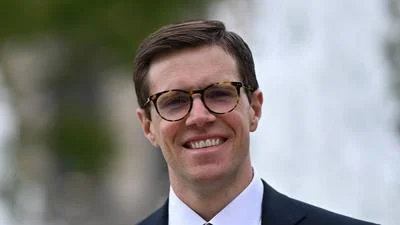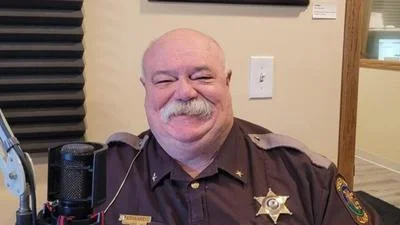Monmouth College issued the following announcement on Sept. 24
As the Oct. 1 date for the international College Radio Day approaches, there’s something that Monmouth College faculty member Chris Goble wants people to know: college radio is often a place of discovery, both for listeners and for the students who are doing the programming.
“We tend to say that college radio is the last bastion of real radio – radio that’s not corporately controlled,” said Goble, who is the adviser for the College’s WPFS-FM (105.9). “It can be a place for new and emerging artists who aren’t signed to big deals and who don’t get big radio play.”
It can also be a place of discovery for students looking for a new experience or a way to express themselves. In fact, the four students who make up the station’s team of executives all tried their hand at radio as Monmouth freshmen and realized it was an activity they enjoyed.
Two of those students, Zac Colberg ’22 of Woodbury, Minnesota, and Troy Hippen ’22 of Monmouth, are communication studies majors who recalled their first show, which featured an eclectic mix of music.
“Troy and I played a little bit of everything,” said Colberg, who might pursue a job related to broadcasting after he graduates next May. “It was all over the place, whatever we wanted to play every week.”
“We went from ’80s hair bands to country to heavy metal to pop to even some early Jackson 5,” said Hippen. “It wasn’t one genre back-to-back. It kept everybody on their toes. That’s the way we wanted it to be.”
Hippen serves as the station’s manager, while Colberg is the marketing manager. Also on the exec team are music director Rose Contreras ’23 of Chicago and social media director Jan Abel ’24 of Galesburg, Illinois. Abel is proof that the station’s audience includes more than just students
“Monmouth is a small town, and I really wanted to ‘diverse it up’ with my own music tastes. I really wanted to let others hear different music.” – Rose Contreras
“My dad would start texting me during every show,” said Abel, whose show this year features classic rock. “He’d say, ‘Longtime caller, first-time listener,’ like every week. It just became a little tradition.”
‘Diverse it up’
Contreras enjoys the opportunity to bring her taste in music from her roots to western Illinois.
“Freshman year, I ran my own show,” she said. “I’ve always wanted to be in radio. I like music. Monmouth is a small town, and I really wanted to ‘diverse it up’ with my own music tastes. I really wanted to let others hear different music.”
Contreras started out playing punk music, then began playing “a lot more Hispanic/Latin tracks. I did a lot of pop and Mexican music, infused together,” she said.
In a normal semester, Goble said a dozen or more students are involved with the station, each typically working one three-hour show, where they let their interests be their guide.
Learn something new
“These different shows that students do can show people, ‘Hey, here’s somebody you’ve never heard of before. Maybe you might like them, or they will lead you to someone else you might like,’” said Goble. “Radio is still where people tend to discover new music or different music they haven’t listened to before.”
And the students learn some valuable lessons, whether they ultimately choose to pursue radio or broadcasting as a career, or not.
“It gives them, even if they’re not thinking about a career in radio, an opportunity to think about their audience and think about how to communicate ideas with other people.” – Chris Goble
“It gives them, even if they’re not thinking about a career in radio, an opportunity to think about their audience and think about how to communicate ideas with other people,” he said.
Goble said the Monmouth community is fortunate to have a commercial radio station in town that still has a local focus, but he said that’s not the case in many markets, making college radio an even more important part of those communities.
“College radio tends to have a diversity of voices and tends to be the last place where that happens because the finances and economics of radio are so different,” he said. “There’s so little localism in radio that college radio in lots of places is really the only station that has much local. We’re lucky to have here in Monmouth a station that’s still very much locally focused, but lots of markets, lots of places don’t.”
Original source can be found here.

Source: Monmouth College





 Alerts Sign-up
Alerts Sign-up